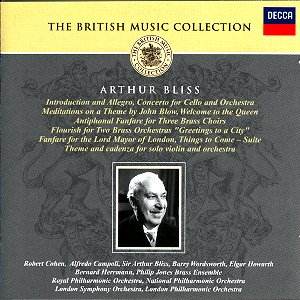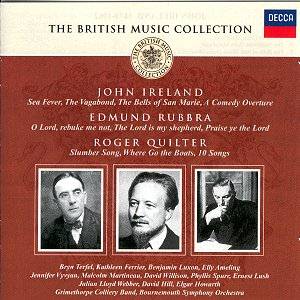 Composer: Arthur Bliss
Composer: Arthur Bliss
Works: Introduction and Allegro, Cello Concerto, Meditations on a Theme by John Blow, Antiphonal Fanfare, Flourish, Welcome to the Queen, Theme and Cadenza for Violin, Things to Come
Performers: Robert Cohen (cello), Alfredo Campoli (violin), Royal Philharmonic Orchestra, London Philharmonic Orchestra, London Symphony Orchestra, National Philharmonic Orchestra, Philip Jones Brass Ensemble
Recording: 1955-1993
Label: Decca
The music of Sir Arthur Bliss, a luminary of British composition in the 20th century, encapsulates a rich tapestry of influences and innovations that merit reevaluation amid a contemporary landscape that often overlooks him in favor of more prominent figures like Elgar and Vaughan Williams. This Decca British Music Collection, spanning recordings made between 1955 and 1993, offers a compelling portal into Bliss’s oeuvre, showcasing works that reflect his unique voice and mastery of orchestral color.
The performances are a mixed bag, yet they are generally solid and reveal the breadth of Bliss’s capabilities. Robert Cohen’s interpretation of the Cello Concerto stands out, conveying the work’s vigorous spirit with commendable technical prowess. This concerto, often unjustly overshadowed by Elgar’s own cello masterpiece, emerges here with a freshness that emphasizes its dynamic contrasts and lyrical themes. Cohen’s ability to navigate the intricate passages with both vigor and sensitivity is commendable, though one may wish for a slightly more nuanced emotional arc in the slow movement, which is a pivotal moment in the work.
The Introduction and Allegro, presented twice in this set—once conducted by Bliss himself and again by Barry Wordsworth—serves as an intriguing case study in interpretative differences. Bliss’s own performance, while historically significant, is somewhat limited by the recording technology of its time, which, though acceptable, does not fully capture the intricate orchestration that Bliss masterfully employs. On the other hand, Wordsworth’s more recent recording benefits from superior sound quality, allowing listeners to appreciate the nuanced textures within the score—most notably the interplay between strings and woodwinds that characterizes Bliss’s distinctive sound world.
The Meditations on a Theme by John Blow stands as one of the collection’s highlights, a work that exemplifies Bliss’s lyrical gift and thematic development. The variations unfold with grace, revealing a profound depth that resonates particularly well in the hands of Wordsworth and the Royal Philharmonic Orchestra. However, while the performance is technically proficient, it occasionally lacks the emotional depth found in earlier interpretations, such as those by the late Sir Charles Mackerras, whose readings are imbued with a palpable intensity that elevates the material.
The contributions of the Philip Jones Brass Ensemble in the various fanfares and lighter works provide a refreshing contrast to the more serious tone of the orchestral pieces. Their performances are vibrant, exuding a sense of buoyancy and flair that underscores the celebratory nature of these compositions. While not groundbreaking, they are executed with precision and a clear understanding of the idiomatic demands of brass music, reminding us of Bliss’s versatility as a composer.
Sound quality across the collection does vary due to the wide span of recording dates, but Decca has done a commendable job of remastering these works to present them in the best possible light. The clarity of the orchestral textures, especially in Wordsworth’s recordings, accentuates Bliss’s skillful orchestration and allows for a richer listening experience. Yet, the accompanying booklet disappoints, failing to provide adequate context or insight into the music, which is a missed opportunity given the significance of these works.
This collection undoubtedly serves as an important resource for those interested in exploring the neglected corners of British music. While it does not present a definitive overview of Bliss’s oeuvre, it offers a satisfying survey of his eclectic output, revealing a composer whose voice is as relevant today as it was in his lifetime. For those willing to delve into the repertoire of this underappreciated master, the Decca British Music Collection is a valuable addition to the recorded legacy of Arthur Bliss, showcasing both the charm and complexity that define his work.



